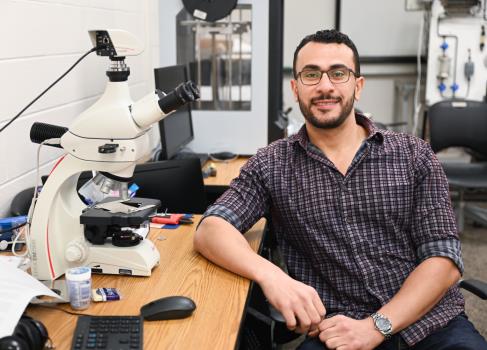
Dr. Hamdy Ibrahim, UTC assistant professor in mechanical engineering, won the $20,000 first prize in the inaugural Fly for Researchers Faculty Pitch Competition. Dr. Ibrahim is developing an implant made from a metal alloy that stabilizes broken bones and then is absorbed by the bone once its work is done.
photo by Angela Foster/UTC
The University of Tennessee at Chattanooga’s Center for Innovation and Entrepreneurship, housed in the Gary W. Rollins College of Business, will host the 2nd annual Fly for Researchers Pitch Competition for UTC faculty and graduate student innovators at 3:30 p.m. on Wednesday, April 19, in the Center’s second-floor offices in the Mapp Building, 410 E. 8th St.
The competition, open to the general public, is geared toward members of the Chattanooga business and entrepreneurial communities. Click here to register to attend the event.
The Fly for Researchers competition spotlights ideas that have the potential to be commercialized or licensed.
A total of $35,000 in internal grants will be awarded—$20,000 for 1st place, $10,000 for 2nd place and $5,000 for 3rd place—and winners will be able to use the money to accelerate the success of their ideas, innovations and commercialization objectives.
In addition, audience members can vote for their choice of the best innovation, with the leading vote recipient winning a $1,000 grant to accelerate commercialization progress. The Audience Choice grant is sponsored by Thomas Lyons, the Clarence E. Harris Chair of Excellence in Entrepreneurship in the Rollins College of Business.
Fly for Researchers Pitch Competition finalists will give five-minute presentations, followed by up to eight minutes of Q&A from the judges. A panel of local business executives and entrepreneurs—Kristina Montague, managing partner of The JumpFund; Rebekah Sharpe, founding partner of Transparency Health; and Tasia Malakasis, CEO of CO.LAB—will serve as judges for the competition.
The finalists:
Whole Homes: An innovative method to ease the burdens and costs of construction when using prefabricated sections to build a full-scale house, shortening the process into days instead of weeks.
- Students Andrew Eubanks and Connor Mackey; Dr. Sungwoo Yang, assistant professor in the Department of Civil and Chemical Engineering
Modular and Pneumatically Actuated Balance Platform: A self-contained, machine-operated platform that uses a wearable device to measure the muscular control of patients with balancing and walking problems due to chronic low back pain or sports-related concussions. Data from the platform can be used to treat the physical issues.
- Dr. Erkan Kaplanoglu, associate professor in the Department of Engineering Management and Technology; Dr. Max Jordon, assistant professor in the Department of Physical Therapy; Dr. Jeremy Bruce, orthopedic surgeon at Erlanger Hospital; Dr. Ahad Nasab, professor and head of the Department of Engineering Management and Technology
Drone-based Artificial Intelligence System to Detect and Assess Damaged Solar Panels: A drone-based Artificial Intelligence system will detect and assess damaged solar panels — cracks, corrosion, dust clouds, etc. — to ensure performance and longevity.
- Dr. Abdul Ofoli, UC Foundation associate professor in the Department of Electrical Engineering; Dr. Vahid Disfani, assistant professor in the Department of Electrical Engineering
Audio Quality eXtreme: A method of adjusting digital audio that improves sound quality, especially with hearing aids, creating a more natural experience for those who wear them.
- Graduate student Joshua Tyler; Dr. Donald Reising, UC Foundation associate professor in the Department of Electrical Engineering
Clear Insulator For Energy Efficient Windows: Development of a gel that will be lower in cost, easier to apply and still as energy-efficient when compared to current methods of retrofitting single-paned windows.
- Dr. Sungwoo Yang, assistant professor in the Department of Civil and Chemical Engineering